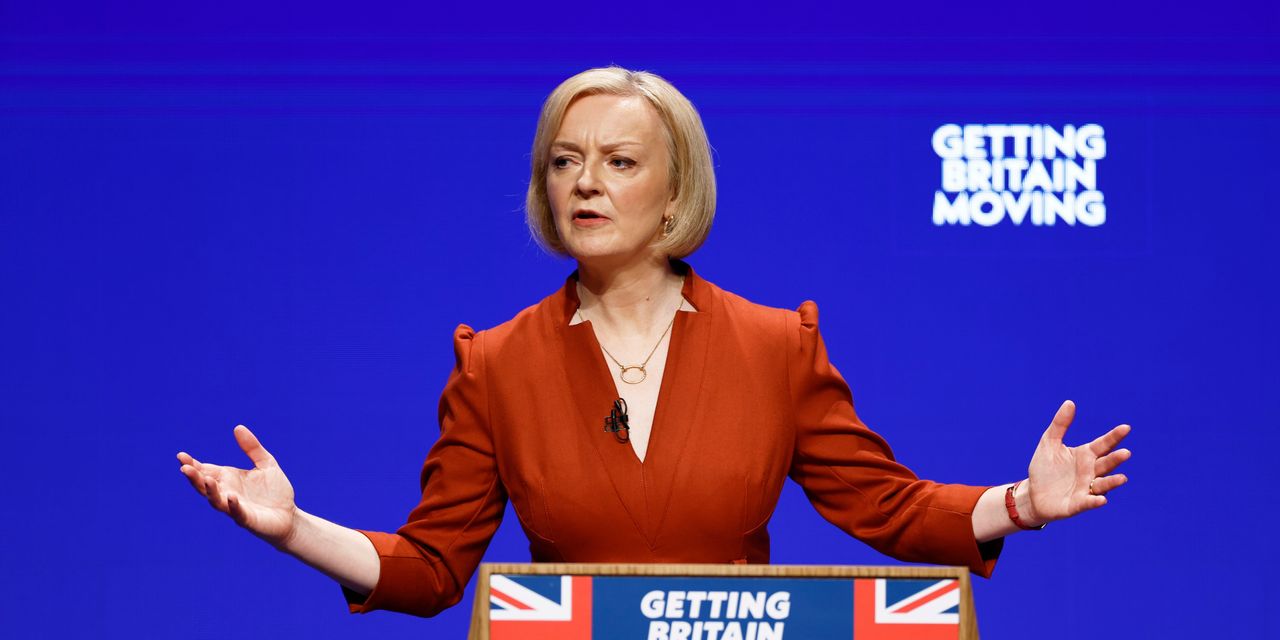Who is left who would want to buy stocks in London-traded companies?
For that matter, who—if anyone—is left to sell them?
If “bull markets are born on pessimism,” as the late, great investor Sir John Templeton famously said, it be would be hard to find anywhere plunged deeper into broad-based pessimism, or even outright despair, as British markets right now.
No one dares own British equities. Pension funds have dumped them. FactSet tells me the London stock market—the fourth biggest national market in the world—now trades on less than 9 times forecast per-share earnings for the next 12 months, compared to around 16 times for the U.S.
Read: Who is Jeremy Hunt? Meet the new U.K. chancellor
All of this surely has to represent an opportunity worth a second or even third look for any U.S. investors looking to take the long view in their 401(k) plans. Anyone interested can get all the exposure they need with two simple U.S. based exchange-traded funds. (More on that below.)
The political, economic and financial crisis currently enveloping Britain shouldn’t really be a surprise to anyone who had previously followed the political career of Liz Truss, the new prime minister. Who could forget her infamous denunciation of foreign cheese? Her claim to the House of Commons that “barking dogs” would help drive away drones? Or the cringeworthy TV interviews that sounded like Sarah Palin with a British accent?
The Conservative members of Parliament — and 81,000 Conservative party members in the country — who were willing to overlook all this in order to install Truss in Number 10 Downing Street must have taken leave of their senses. Their reward, after barely a month of her reign, is to see the opposition Labour Party about 30 percentage points ahead in the polls, the British bond market in crisis and the Bank of England desperately trying to prevent a financial collapse.
All of this was sparked by her government’s announcement last month of big, unfunded tax cuts.
A friend who works in the British financial markets, a former Conservative party activist, attended a bond market conference in London this week and reported that sentiment was so panicked he expects Truss will have to abandon the tax cuts, or drastically scale them back. If she doesn’t, her plans may simply face defeat in the Commons—possibly sparking an immediate general election.
If all of this makes you think no sane person would invest in British assets at this point—well, that’s the point. Markets are liquid. Prices adapt to the sentiment of the moment. Measured in U.S. dollars, the London stock market is already back to where it was in October 2020, before confirmation of the first Covid vaccines.
A key to the London market is that it has remarkably little to do with the U.K. anyway. It is dominated by a handful of global companies that simply happen to be headquartered in London, often for historic reasons. These include oil and resource giants like Shell, BP, Glencore, Rio Tinto and Anglo American, multinational consumer goods empires like Unilever, Reckitt Benckiser and Diageo, drugs companies GSK and AstraZeneca, and so on. Companies in the FTSE 100 blue chip index generate about three-quarters of their revenues from outside the U.K.
Joachim Klement, strategist at Liberum in London, says that for U.S.-based investors there could hardly be a better time to invest in the U.K. than now.
“The pound is very cheap and U.K. stocks are cheap both relative to their own history and vs the U.S. market,” he tells me. Even when adjusting for differences in sectors, he says, “U.K. equities are currently 24% cheaper than the U.S. In particular the mid cap FTSE 250 which is much less exposed to commodities and banks than the FTSE 100 is very cheap right now. It is trading at a PE-ratio of 10x.”
Meanwhile, the collapse of the pound means two things which are potentially very bullish. The first is that London is now incredibly cheap for foreign visitors. (I’ve spent plenty of time walking around, and as far as I can see the capital’s bars, restaurants and shops are already booming.) The second is that global companies, including private-equity funds, will find it very easy to start acquiring U.K.-listed assets.
Investors can invest in the U.K. market very easily through the Franklin Templeton Great Britain ETF
FLGB,
which charges a tiny fee of just 0.09% a year. The problem is that, following the U.K. indexes, it is heavily weighted towards energy and resource stocks at the moment: Together they account for about 25% of the fund, mainly as a result of behemoths like Shell. Maybe those stocks are a good deal, or maybe not. But betting heavily on resources isn’t quite the point.
Meanwhile the iShares MSCI United Kingdom Small Cap ETF
EWUS,
which avoids those big companies altogether, carries a heftier expense ratio of 0.59%.
So if you split your stake evenly between the two, say, you would get a broad exposure to U.K. stocks for a more reasonable 0.34% a year.
Buying low and selling high, as they say, is “simple but not easy.” Buying U.K. stocks right now is not easy — which may be a good reason to think about doing it.
